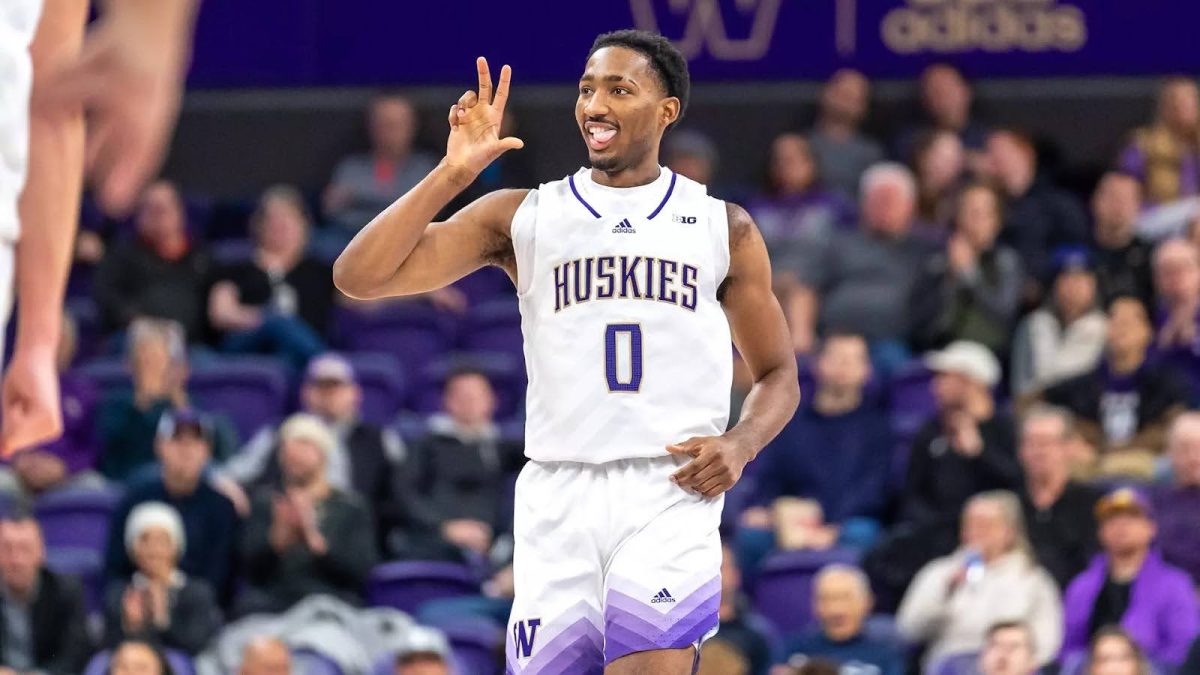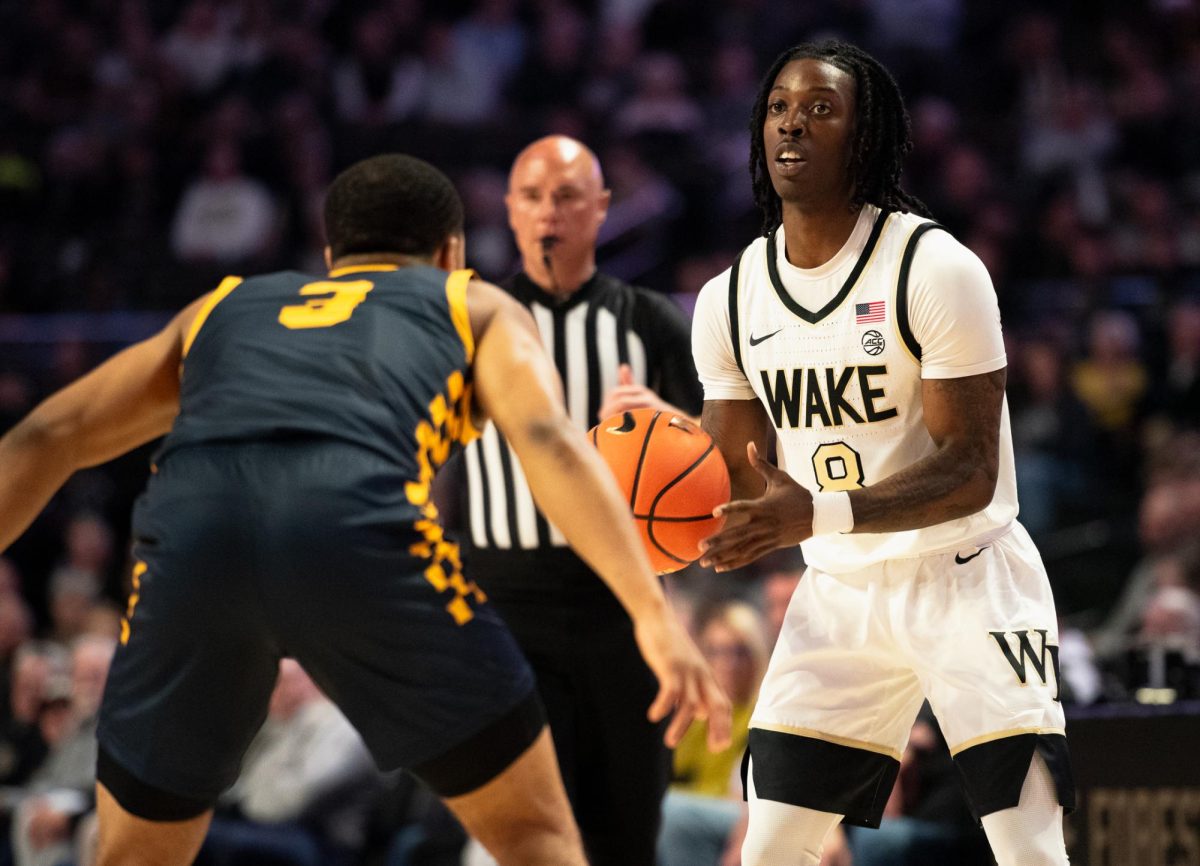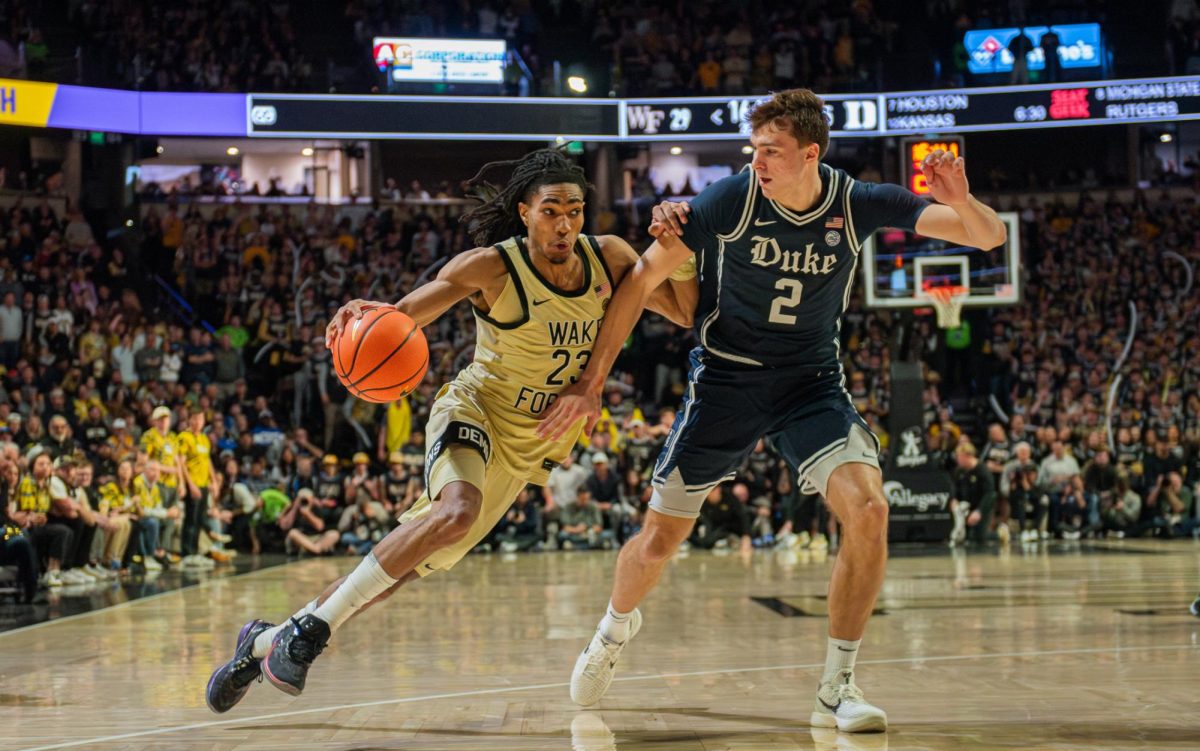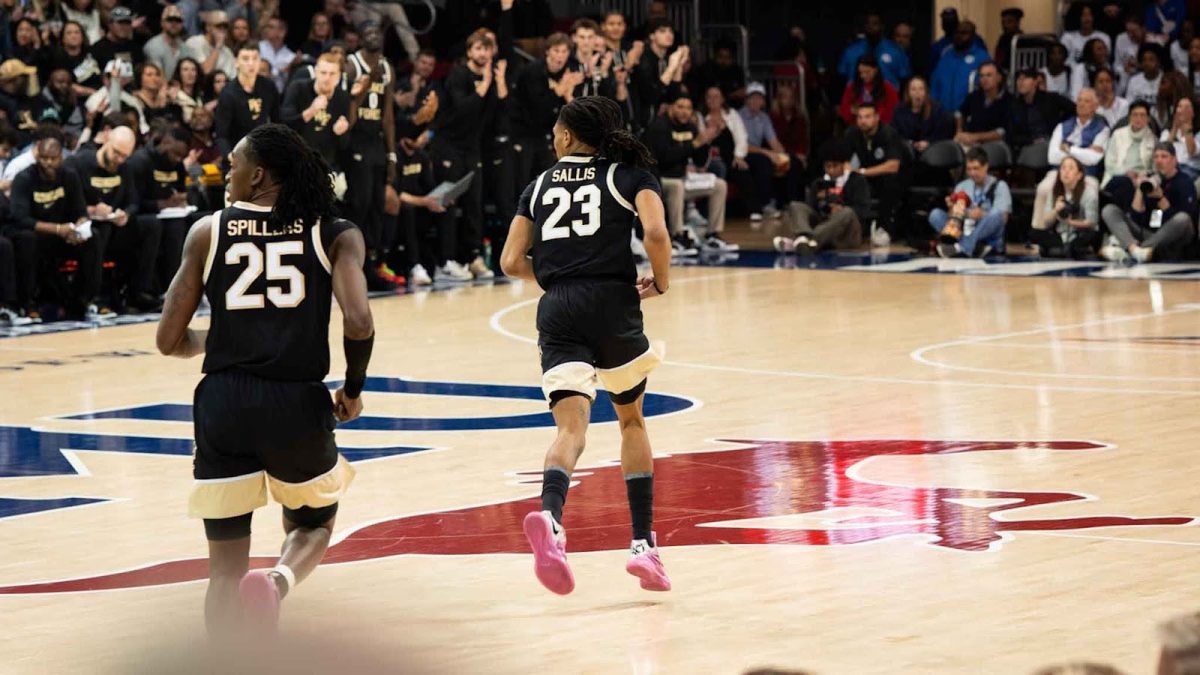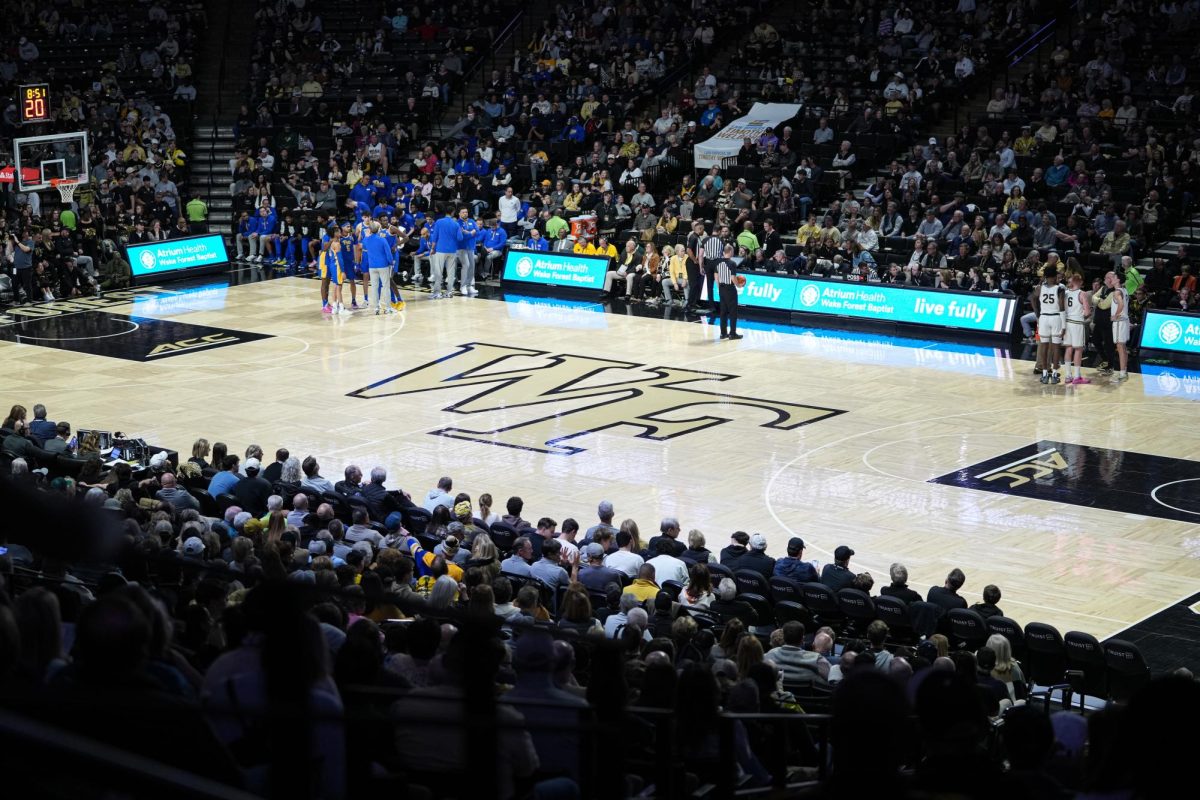Earlier this week, Sports Editors Ben Conroy and Will Zimmerman sat down with Athletic Director John Currie for a Zoom conversation surrounding the hiring of new head coach Steve Forbes and the future of Wake Forest men’s basketball.
After former head coach Danny Manning was fired at the end of April, Currie moved swiftly to hire Forbes to take on the position. Before taking on this position at Wake Forest, Forbes was the head coach at East Tennessee State University. During the 2019-2020 season, he touted a 30-4 record.
Learn more about the unique hiring process that took place, what Currie was focused on when conducting the search for a new head coach and what Forbes is bringing to the future of Wake Forest men’s basketball.
Ben Conroy: Hello everyone, my name is Ben Conroy and I’m here with my co-editor Will Zimmerman and we’re here with athletic director John Currie to ask him a couple questions about the recent hiring of coach Steve Forbes for the men’s basketball program. So, Will if you want to kick us off with some questions …
Will Zimmerman: Sure. These are obviously unprecedented times and I’m sure that the process has changed, but during normal times, what would the process be for hiring a new coach and how has it been affected by quarantine and the global health crisis?
Athletic Director John Currie: Sure, thanks Will. Our first priority is always the health and safety of our student-athletes our students, our staff etc., so you know this whole process — from the end of the season until May 1, when we introduced coach Forbes as our new head basketball coach at Wake Forest — has certainly been affected in lots of different ways. You know, candidly, there are some elements of having to do search under the COVID-19 environment — there were some elements that were kind of helpful in the fact that we had social distancing and all that stuff. And then again there were some things that made it much more difficult, so certainly the fact that we did most of our meetings and group interviews and that stuff on Zoom — on the Zoom platform was different than what I have done in the past. This was the 10th head coaching search that I’ve led as an athletic director. I probably was involved in three or four as an associate AD before so, never done one quite like this. I’ve never done one where I didn’t get on an airplane at least once. I did make two car trips, but they were relatively short car trips, I didn’t earn any hotel points and so in a lot of ways it was helpful.
It was also a bit unusual. Usually, when I had a coaching transition, I up and left town because if I’m in town and around and people know I’m there, you know, maybe they ask ‘what’s he doing?’ or ‘why’s he not working on our search?’ or, people are able to talk about that, so I usually leave town and go somewhere. In this particular case there wasn’t any reason to leave town because I can go to the office and no one’s around. Campus is empty and nobody’s really tracking me or anything like that.
So, the other element about this search that was different, not necessarily because of COVID-19, but this particular hire is so important for Wake Forest. There’s so many people that have either real investment or emotional investment in Wake Forest basketball and men’s basketball at Wake Forest and what it’s meant to us historically. As you guys know, from being on Wake Forest campus, we’re a little bit different than some. If you take the power five institutions, we would have to be one of the more personality — not personality but, interpersonally-driven institutions in the country. And that’s one of our advantages, right? We’re different than other folks because we do have a crucible, if you will, that gives the opportunity to develop stronger relationships, and as a result, it’s important when you bring someone on to our campus community. It’s going to have such an important role — for people inside the campus community to feel like they were represented in one way or another in the selection process or the evaluation process for that particular candidate.
So, in this case, as I talked about in our press conference on Friday, beginning Saturday night — last Saturday — obviously we’ve had the press conference earlier that day about our transition. Beginning Saturday night we had an incredible group of university leaders that came together to review and evaluate the candidates that we put before them and then discuss an interview process that was really unlike most interview processes at this level in terms of the inclusion of high level academic leaders in the process. So, with Provost [Rogan] Kersh, Dean [Michele] Gillespie, Dr. [Peter] Brubaker — who’s our faculty athletic rep — and Dean [Jonathan] Walton — who is the Dean of our Divinity School — as well as a member of the presidential cabinet, Lindsay Babcock and the athletic staff, and Pete Parkes. You know, we spent two hours together on Saturday night and then we started those Zoom interviews of candidates on Sunday and continued into Monday.
And so, in a normal time, back to the question that you asked like 45 minutes ago, Will, that I haven’t answered yet in a normal time, you would have said ‘Well we need to get that group together, and so let’s all get to the Chicago Hilton,’ or ‘Let’s get the Grand Hyatt — the Grand Hyatt at DFW Airport’ or ‘Let’s go to the Westin in Denver’ and have Airport interviews and have all these people be there, that was totally impractical in this moment in time. But, because we didn’t have to think about whether we can get all these people in a particular place, we could do it on Zoom. It was very effective and very helpful. Hopefully that was kind of a good look at your question.
Zimmerman: Kind of going off of that, as you’re honing in on the search and you’re doing the interview process, what about Forbes made you feel that he’s the right guy for the job, and did your time working together in the past at Tennessee play any role in the decision?
Currie: Well we had a great number of candidates who were very interested in our job. We couldn’t interview them all, but we had excellent candidates, excellent coaches at lots of different levels around the country who had an immediate interest in the opening of Wake Forest because of all the advantages that you guys know. We have spectacular facilities, but we also have the most beautiful campus in America, and we’ve got this great city of Winston-Salem that’s got all these things going for it. We’re in a state with a lot of basketball players and we’re in a state with a good school system, so you have student athletes coming out of our high school ranks in the state of North Carolina who can do the academic work at Wake Forest. So, all those attributes make this a very, very attractive job — being in the ACC, you name it.
So, I said in the press conference last Saturday, nine days ago, ‘One of the hardest things would be narrowing down that field.’ And so, if you look at all of our candidates, we needed people, we needed energy, we needed recruiting, and relationship building, and evidence of the plan — not just ‘I have a plan’ — but evidence of how they’ve executed the plan, and showing adaptability. We needed, you know, high intelligence, organization, all those kinds of things. Obviously, we had to have a person of character and we wanted somebody that believed in what we do at Wake Forest and believe that college athletics intrinsically is within the construct of higher education. And so, coach Forbes fit all those measures.
And, he’s a hell of a ball coach as evidenced by his record, both his five years at East Tennessee State as a head coach, but also all those years of coaching community college basketball. And winning.
Another element of coach Forbes I think, that was a big differentiator, is the fact that he’s made tough transitions before. You know, the fact that he’s transitioned into jobs — there’s an art and skill to that and a level of experience that comes along with that. Him having a staff, a number of coaches that he knew would translate to this level, because they’ve been at this level. So, BJ Mackey played for South Carolina — he’s the all-time leading scorer at South Carolina — he’s familiar with the Carolinas. All of our candidates agreed that we had to do a better job at recruiting and establishing a presence in North Carolina, and the Carolinas in general, so coach Mackey would bring high-level guidance. (From) East Tennessee State, he can transition right into the ACC.
Brooke Savage, who was with him and who’s also coming [to Wake Forest] was on the staff at Tennessee — is a Tennessee grad and has experience in a high level as well. And then, so you add all that together, those guys can come down and they don’t have to figure out who’s going to do what (because) they know what their responsibilities are coming in the door.
Conroy: Alright so moving on from that, you kind of touched on this earlier, but Manning was let go on Saturday and then Forbes accepted his offer just on the following Thursday, so if you care to comment a little bit on how you guys were able to move through that process so quickly.
Currie: Well one of the AD’s responsibilities, or any Leaders responsibilities, is preparation for transition. And so, actually this was not the fastest men basketball search I’ve done. When we hired coach Weber at Kansas State in 2012 we did that in 100 hours, I think, from the time we had the press conference to the announcement, it was a hundred hours.
In this particular case I need to back and calculate it up but I think it’s 116 hours or 112 hours from the time we had the press conference Saturday until the time we made the announcement shortly after 1:00 [p.m.] on Thursday. You know, when we go through a process like this … well let me back up our first goal. We’ve got five core goals at Wake Forest, and our first goal is to offer a world-class student athlete experience. Student athletes are at the center of everything we do, we can easily be distracted by that, but it comes down to, we’ve got a handful of student athletes, who during the coaching transition, are in an extraordinarily uncertain time. It is our responsibility as athletic directors to reduce that time of uncertainty, in as much reason as I can, for those student athletes and for a program, and enable us to get moving forward. So, that’s always a focus.
So, I did not know on the outset when I stood before you — or Zoom — last Saturday that we were gonna hire Steve Forbes but I certainly knew who Steve Forbes was and I certainly knew who other coaches were that may or may not fit Wake Forest. There were some coaches — extraordinary coaches — as I mentioned who were interested in the job but that Saturday night they just didn’t make the cut list as we sought to narrow it down.
Conroy: All right so you also touched on this earlier, Forbes obviously has a very impressive track record during his time at ETSU and his time at Tennessee and Wichita State and other programs like that, they’ve played a lot of post-season basketball, what do you attribute his sustained success to, and how do you see it carrying over as he takes the helm of Wake Forest’s program?
Currie: Well, first and foremost, Forbes has been committed to education his whole life. He’s a first generation college student, and if you look at what that’s translated into … from an athletic scholarship at southern Arkansas University — I think that’s the name of it — from an athletic scholarship there, the transformation resulting from that is his daughter Elizabeth is finishing her Ph.D., their son Christopher is finishing his master’s degree, his wife Ginetta — to whom he has been married for 32 years — is a 32 year elementary school teacher. So there’s a real commitment to education and understanding the value of education there. And so, that’s one of the things I think that’s made him successful throughout his career.
But then, he’s also been a great learner, and you think about the people he’s been around. I believe in his press conference — some of it’s running together — he talked about the way they transformed and changed their offense this year at East Tennessee State. You know, having the courage to take something that was pretty good, I think when they won 24 or 25 games a year before, and this year they went in and they tinkered with it and they broke it down. Nick Nurse is a really close friend of his, and he’s the head coach of the Toronto Raptors, and they broke it down and they had the courage to make those changes and tune that thing up. And so, instead they won 30 games this year.
Having that adaptability, and the ability to take the personnel, look at how they maximize their student athletes opportunities, it’s very impressive for Steve Forbes.
Zimmerman: So, obviously he’s a great coach. He’s won a lot of games in the past five seasons at ETSU, and during that time, I think that there’s been a really positive influence on the role of basketball at ETSU in general. So just looking over the last 14 years, Wake Forest had the lowest attendance they’ve ever had this past season. What do you think Forbes will bring to this program that will allow for more fan interest at the games?
Currie: I’m looking to turn around and ask you guys, but here is what I would say, since you’re asking me the questions, so I don’t want to not be responsive to your question.
Number one, he’s bringing energy and he’s bringing a proven ability to, number two, build relationships. Steve Forbes loves to be around people and one of his challenges — I’m going to have to do a good job of — making sure he maintains his focus, but I’m not worried about that. He’s a guy that says he won’t say no, and all that kind of stuff. And so, he will be very visible and very present — I think our students have already responded to him. I’m trying to stay off Twitter since the change, but I understand that from Twitter and Instagram and all that kind of stuff, our students have been highly engaged with him. He engages on Twitter himself late at night, he’s been a pretty significant participant in the social media realm.
I’d also say that, you know at East Tennessee State, I think he talked about East Tennessee State being a really proud program that had been through a tough time, he said a time when it’s kind of malaise, and we’re kind of the same way at Wake Forest. We have incredible success — it’s not pockets of success, it’s sustained periods of success — bordered by pockets of frustration. Certainly, the last 10 years have been a big pocket of frustration, and so he had to do the same thing reinvigorating East Tennessee State. I don’t recall the exact statistic, but I think they’ve drawn 160,000 people more in [the last] five years than they did the previous five years. I know that that’ll be a big point of emphasis for him.
It’s been awesome to see the energy already from our fans in that regard, you know, college basketball is about students and it’s about the student athletes. We saw it this year — we saw it this year we had the big win over Duke. The energy and the number of students that came up to me and said ‘that’s the best thing that’s ever happened,’ you know, and the fun on the quad — I mean that’s what it’s all about. That’s the environment that I experienced when I was a student at Wake Forest and then the six years I worked here at Wake Forest in the 90s, and I want our students to — I want you to — have that. I want students to have that experience when they come to Wake Forest at the same time, you know, it’s a symbiotic relationship — you’re gonna get out of it as students what you put into it. If students choose to be part of the solution, knowing that it’s gonna be a challenging year this coming year, right. But, if students will get there and be part of it, that’s gonna help him from a recruiting standpoint — it’s going to help our own athletes feel good about the effort they’re putting into the thing. Then, as we build it, it’s gonna be a lot more fun for students at the end when we’re playing meaningful games in March. As coach Forbes likes to say it’s going to be a lot more fun for students to say ‘I’ve been at every game since the first of November, I’ve done my part to help get this thing going, get it where it needs to be.’
Zimmerman: That’s great. So, you talked a little bit about Duke and, you know, we had an awesome game and a great win. But overall, over the past couple years Wake [Forest] has not fared very well in the ACC. What do you think Mr. Forbes will bring to the table in terms of allowing us to compete in what’s arguably the strongest conference in the country?
Currie: And it’s the best in the country, it’s got the most sustained success and notoriety in the country, and great coaches. I mean look at all the teams and look at all these programs in our league that have won the national championship. You got Syracuse, Virginia, Duke, North Carolina, North Carolina State. You go on down the list and programs — Georgia Tech — have been in the Final Four. So there’s been some incredible sustained success in the history in our league and that’s attractive to coaches because it helps them recruit the best players and all that kind of stuff, but there’s no question in my mind that he’s going to build us back into a competitor in the way he evaluates the recruits, the way he builds culture within his program.
I loved what he talked about last week at the press conference about this being a player’s program — the program belongs to the players, the coaches are stewards, but the program belongs to the players and building that sense of player ownership. I think all of those things are reasons why we’re going to be back in contention soon. The other thing I would mention is that Wake Forest is different because we’re in the city of Winston-Salem. There’s a lot of schools that have basketball tradition, but they don’t have a city that’s broader than just the school itself. We have the benefit of bringing both a community that loves basketball and has a basketball heritage inside the ACC and Tobacco Road, and all that kind of stuff, and we have the benefit of the fact that Wake Forest is inside the community. You got people that love basketball and Wake Forest is my town, and my team, because it’s in town. And then, you got people that went to Wake Forest or are affiliated with Wake Forest and love basketball. So you bubble all that in — 300,000 people in our little city here — that’s a huge advantage that some, even some blue bread programs, they don’t have.
I love the idea of seeing the [Lawrence Joel Veterans Memorial Coliseum] packed again with people that have been brought together from outside just off the Reynolda campus, but throughout the city, throughout the community. When we talk about bringing value to Wake Forest, bringing value to the Winston-Salem community, bringing value to the Tri and beyond one, of the responsibilities that athletics has is to connect the university to its surrounding community, and we take that very seriously.
Conroy: That’s a great point. There have been several Wake Forest players that have recently entered the transfer portal – Oliver Sarr, Jahcobi Neath, Ismael Massoud – among a few others. In light of everything that’s happened, do you see these players potentially choosing to return to Wake, and what role, if any, will Forbes play in returning this talent?
Currie: Well I think it depends on lots of things, but certainly I thought coach Forbes – his comments about complementing coach Manning Friday in terms of who he brought to Wake Forest – I mean all those men that you just mentioned, I think very highly of. I had a chance to speak to every player last Friday, last Saturday, Sunday and Monday at length about what they wanted to see in their new coach, and I believe we’ve delivered a coach that meets a lot of those criteria. I know he’ll be working very hard to, as it’s his first priority, to recruit those players, so to speak. As I mentioned earlier, this is a time of anxiety and uncertainty and those players absolutely should take the time to assess the situation versus what other options that they may have, at the end of the day.
I like what Coach Forbes says ‘We got the triple-double right here in Winston-Salem. We got a top 30 University; we’ve got incredible facilities and we’ve got a fan base.’ We’re going to win here. I want all the student athletes to come back and be a part of earning a Wake Forest degree – which lasts a lifetime – and being part of a rebuilt championship tradition.
Conroy: Okay, great. So, to continue off of that, there’s kind of a tendency for some players to hesitate to commit to play under a first-year coach, so what qualities about Forbes do you think will allow him to overcome this barrier, and kind of gain the respect and the trust of the team?
Curry: Well, all you have to do is look at the record. And then, look at the accolades. If you look at what he did taking over East Tennessee State…our program, we won 13 games this year, we won 11 games last year and we were very close and we were much improved, I think. But, if you look at what he did taking over that East Tennessee State team and turning it into a contender right away, I think that would be very encouraging to me, and y’all, and certainly to our players as well.
If you look at the testaments from around the country, you know, every single basketball writer in the country has praised coach Forbes and been very positive about this hire. You got an Nick Nurse, you got former players – you got a bunch of former players actually – a list on our website with East Tennessee State players, Wichita State players. I got a text from my buddy [SEC Network’s] Dane Bradshaw the other day, just one after another praising the kind of man, the kind of person, kind of coach Steve Forbes is for our program.
Zimmerman: I think a lot of people would agree that it’s a great hire, but it takes more than just a head coach to really produce this sustained success over time. Has Forbes talked about any other staff that he’s going to bring in, or are things going to remain in largely the same format that they were under head coach Manning?
Currie: Sure. Well, it’s always up to the coach. One of the differences between college athletics and professional athletics is in pro athletics you have a president of the franchise, you have a general manager, and you have a coach. The general manager is really the person who’s in charge of hiring assistant coaches, is in charge of the draft and the player procurement. The general manager and the head coach sometimes are in total alignment, but sometimes, you know, the general manager is just giving it all to the head coach and the head coach decides (what to do with those players). The difference in the college scene is that the AD is not the general manager, the AD is more like the team president. The head coach is the general manager in college and it’s the head coach’s responsibility (to determine staffing). It’s Dave Clawson’s responsibility to hire the assistants for the football program and it’s his responsibility to recruit the players.
I have a responsibility to ensure that we’re getting good people, but hiring good people is a delegated responsibility to our head coaches, and if they don’t do that, that’s a different kind of problem, right? So, it’s really up to coach Forbes, just like it was up to coach Clawson when he came here. It was up to Randi Smart when she became our new volleyball coach last fall and she made some staffing decisions. It’s really up to the coach, and so, one of the good things about a coach who has been doing it for years and has been a head coach multiple times, is that they know what their priorities are.
Conroy: Okay, so one final question here. There have been some conflicting reports that have emerged surrounding the nature of coach Manning’s buyout. The original figure was reported to be 15 million but there are other reports that say the school is planning to pursue a different course of action. So, what comment, if any, do you have on this situation?
Currie: Respectfully, I have no comment because Wake Forest has a practice and a policy to not comment on personnel matters and personnel agreements.
Conroy: Got it. Thank you so much for taking the time, Athletic Director Currie.
Editor’s Note: This interview has been edited for clarity, grammar and AP Style.











